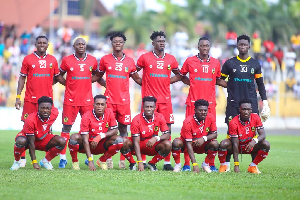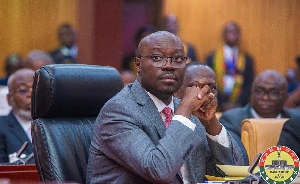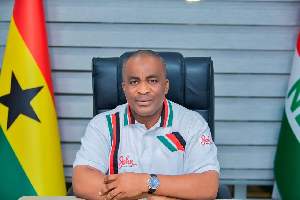When the names and the achievements of presidents are mentioned, it does not usually come with the mention of the spouses of these Heads of States.
Besides, while most leaders rise to the high office through the ballot, their spouses do not need such validation but that has not left many of such partners out of the spotlight, beyond the obvious fame that comes with rubbing shoulders with such heights of power.
The likes of Michel Obama and Hillary Clinton, both of the United States of America, inspire many but what is our own version on the continent of Africa?
In this listicle, GhanaWeb’s Etsey Atisu sums up nominations of First Ladies of very famous presidents from Africa, whose individual forcefulness and contributions, have set them on as equal the levels of fame and power their husbands occupied.
This list however has no husband (man) as there have been only a handful of female presidents in the history of the continent of Africa, with little or almost nothing known about these husbands.
Winnie Madikizela-Mandela
Winnie Madikizela-Mandela was the wife of one of Africa’s most famous, and arguably the world’s most iconic political leader emanating from Africa.
Born the fifth of nine children in 1936, to her teacher and then later politician-father, and her science teacher mother, Columbus and Nomathamsanqa Mzaidume (Gertrude), her parents had wished she was born a boy.
Perhaps, it is the reason her growing up years would be characterized by such bravado and persistence.
“Her parents desperately wished Winnie had been born a boy and growing up, Winnie took pains to fulfil the role of tomboy by playing with the other boys in her peer group, practicing stick fighting and setting traps for animals. Once, while quarrelling with her younger sister, Princess, Winnie fashioned a knuckleduster out of a nail and a baking powder tin and accidentally struck her sister across the face while aiming for her arm. It was one of many instances for which her mother administered a hefty beating,” a biography on sahistory.org.za reports.
The report further states that Winnie was twenty-two when she met Nelson Mandela, who was sixteen years her senior, and already a famous anti-apartheid figure - one of the key defendants in the Treason Trial which had commenced the year before, in 1956.
“From the very beginning, Nelson was ensconced in the Liberation Struggle, and the parameters of their romance were set by his commitment to political change.”
In October 1958, Winnie took part in a mass action which mobilized women to protest against the Apartheid government’s infamous pass laws, followed by a similar action that had taken place in Pretoria in August 1956. During the protest, the police arrested 1000 women.
On Sunday 5 August 1961, the police finally apprehended Nelson while he was driving from Durban to Johannesburg. It was to be the beginning of his 27-year detention and another event that caused an irrevocable change to the direction of Winnie’s life.
With Nelson in jail and in virtual isolation for the first four months of his detention, the police, sensing Winnie’s potential to carry the cause, slapped her with a banning order on 28 December 1962. This restricted her movements to the magisterial district of Johannesburg; prohibited her from entering any educational premises and barred her from attending or addressing any meetings or gatherings where more than two people were present. Moreover, the banning order also stipulated that media outlets were no longer permitted to quote anything she said, effectively gagging her voice too.
Winnie appeared before the nation's Truth and Reconciliation Commission in 1997 and was found responsible for "gross violations of human rights" in connection to the killings and tortures implemented by her bodyguards. While ANC leaders kept their political distance, Winnie still retained grassroots following. She was re-elected to Parliament in 1999, only to be convicted of economic fraud in 2003. She quickly resigned from her post, though her conviction was later overturned.
Following extended hospital visits to treat a kidney infection, Winnie passed away on April 2, 2018, in Johannesburg.
Despite the conflicts, Winnie is still widely revered for her role in ending South Africa's oppressive policies. Her story has been the subject of an opera, books and films, her character interpreted by many different actresses across numerous productions. She was played by actress Alfre Woodard in the 1987 television movie Mandela; by Sophie Okonedo in the TV movie Mrs. Mandela (2010); and by Jennifer Hudson in the 2011 film Winnie.
Nana Konadu Agyeman Rawlings
Being the wife of a former military leader in Ghana, and the country’s first president in the Fourth Republic (Ghana’s most stable republic) as well as the longest serving president, Nana Konadu Agyeman Rawlings did not allow her place as a wife to stop her from also climbing to the high office of president.
She was thrust into the political limelight when her husband, Jerry John Rawlings, usurped power in successive coups, first in 1979 and then in 1981. He ruled the country until 2001. Some scholars say the secret match of Jerry Rawlings success was his wife.
Nana Konadu Agyeman Rawlings was elected First Vice Chairperson of Ghana’s National Democratic Congress (NDC) in 2009. Two years later, she challenged the late President John Evans Atta Mills in a bid to be the ruling party’s presidential candidate but she lost.
In 2016, she became the first woman in Ghana to run for president in an election that dubbed her the African Hillary Clinton. She lost after garnering less than one percent of the national votes.
Her supporters blamed a narrow electoral college and too few women delegates for her defeat but analysts say, besides Ghana’s founding father, Kwame Nkrumah, perhaps no other political leader has made such impact on Ghana than Jerry John Rawlings.
Nana Konadu Agyeman Rawlings is also known for being a fierce advocate for women’s rights. She’s the founder of the 31st Women Movement, an organization that works to eliminate poverty among women and children.
In her memoir, It Takes A Woman, she writes about championing that cause and why her husband worked to transform Ghana into a model of African democracy. Today, working class Ghanaians term her husband as one of Ghana’s best performing presidents.
Although Jerry John Rawlings is no longer alive, Nana Konadu Agyeman Rawlings continues to command a lot of respect, recognized too as the most popular First Lady from Ghana, only next to the wife of Kwame Nkrumah, Fathia Nkrumah.
Grace Mugabe
Her political career spanned a mere three years (2014-2017) when she was elected as the President of the ZANU-PF Women’s League. This role meant that she automatically became a member of the party’s Politburo. She was successful in gaining support for her husband’s tenure as well as her own political ambitions from religious leaders, youth and the Women’s League, traditional leaders, and minority apostolic churches.
This is how the BBC summed up her life story:
Zimbabwe's former first lady Grace Mugabe, a polarising figure, had for years been positioning herself as a potential successor to her 93-year-old husband Robert as president.
Once a quiet figure known for her shopping and her charity work, she became more high-profile in the ruling Zanu-PF party as the head of its women's league. She was instrumental in the ousting of several alternative potential successors to her husband's presidency.
However, she did not get the better of her main rival, former Vice-President Emmerson Mnangagwa.
• Began affair with Robert Mugabe, 41 years her senior, while working as a typist in state house
• Mr Mugabe was still married to his first wife, Sally, who was terminally ill at the time
• Married Mr Mugabe, her second husband, in 1996 in an extravagant ceremony
• They have three children - Bona, Robert and Chatunga
• Nicknamed "Gucci Grace" by her critics who accuse her of lavish spending
• Named head of Zanu-PF women's league in 2014, had been tipped to be named vice-president in December
• Accused of assaulting a model in South Africa in 2017
Click to view details



Africa News of Friday, 14 May 2021
Source: www.ghanaweb.com

















